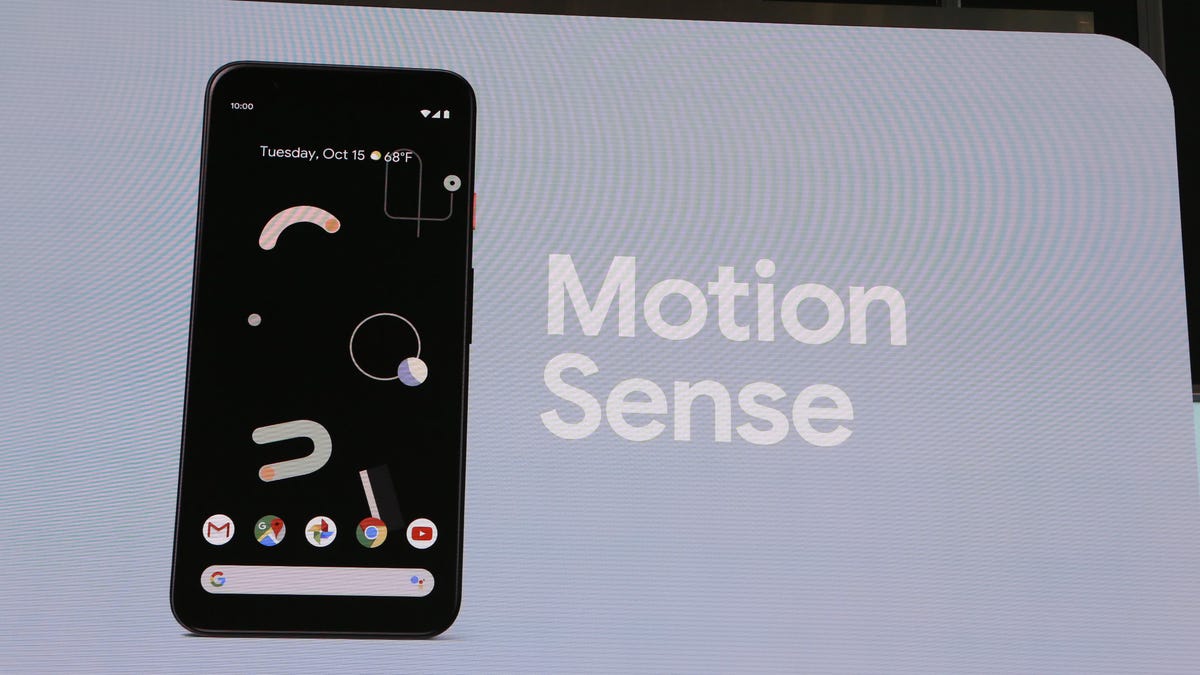Google's Pixel 4 wants to deliver on privacy and security
"Your phone has some of your most personal, private information, and we have a responsibility to keep it safe and secure."

The Pixel 4 now has motion sensing through a radar on the top of the phone.
Google's new Pixel 4 phone includes a motion sensor, allowing people to make commands through simple swipes through the air. It's powered by radar on the front of the phone that can detect motion -- and that can lead to privacy concerns.
At its "Made by Google" event in New York on Tuesday, the tech giant promised that people would be in control of the data that the motion sensors generate.
"Since the Soli sensor can detect the environment around Pixel 4, privacy had to be built in from the start," said Google's vice president of product management, Sabrina Ellis.
Ellis said that people can turn Motion Sense off at any time and that the data collected by the radar is stored internally on the device.
"It's never saved or shared with other Google services," she said.
See also
- Google Home event 2019: Pixel 4, Pixelbook Go, Nest Mini, Pixel Buds, Stadia and more
- Google Pixel 4 and 4 XL hands-on: Two rear cameras and that ugly notch is gone
- Pixel Buds: Google's new wireless headphones are 'floating computers in your ear'
- Nest Mini: Say hello to the newest (and smallest) Google Assistant smart speaker
The tech industry is facing consumers and legislators who are ever more wary about abuses of data privacy, after years of scandals and surveillance concerns. Google's reputation has taken hits from stories about how the company keeps tabs on users, from having humans review conversations with its voice assistant to tracking user location data. In response, Google has taken action like providing Incognito Mode for its Maps services and changing its voice improvement programs to opt-in.
A tough new data privacy law is set to go into effect in California in January. Google has backed efforts for federal legislation that would make state laws obsolete. It also took out ads in the Washington Post to highlights its privacy setting changes.
Ellis, along with other Google executives at Tuesday event, made several promises on privacy protection regarding the Pixel 4. It's a challenge as Google looks to create "ambient computing," which Google's hardware chief, Rick Osterloh, described as a way to have technology meshed into people's everyday lives.
"When computing is always available, designing for security and privacy becomes more important than ever. You need to know your data is safe," Osterloh said.
Security on the Pixel 4 is powered by Google's Titan M chip, which the company first used for the Pixel 3 phone in 2018.
The chip is a spin-off of security hardware that the tech giant used for its cloud servers, meant to keep its software safe from cyberattacks. This chip allows for features like Verified Boot on Android devices, which is meant to make sure that the software and hardware are free of malware whenever they up.
It also provides stronger encryption features for Android phones and creates private keys for third-party apps and payments. With the Pixel 4, it'll also be protecting people's face data, Ellis said.
Facial recognition has made its way to Google's Pixel 4, using the biometric tech as a feature to unlock the phones, similar to Apple's Face ID.
This isn't the first Google device to feature facial recognition as a tool. The Nest Hub uses AI to scan people's faces in their homes. Privacy concerns aren't so easy to address with facial recognition tools -- changing your interests and shopping habits is much easier than changing your face.
Google said the Titan M chip will sufficiently protect people's sensitive data.
"Your phone has some of your most personal, private information, and we have a responsibility to keep it safe and secure," Ellis said.

